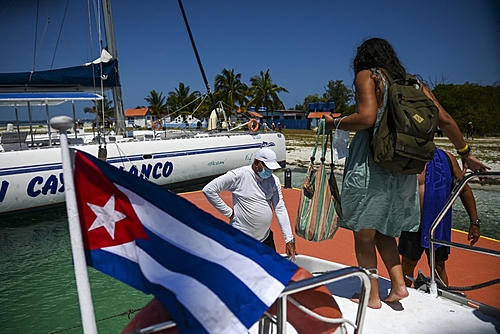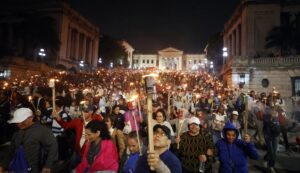
Tourism is the main economic activity in Cuba. Its paradisiacal beaches and natural landscapes were included this year by The New York Times in its list of 52 recommended places to travel around the world. At the same time, the Travelers’ Choice Awards, an annual list compiled by the travel website Tripadvisor, placed Cuba among this year’s “trend-setting destinations”.
Year after year, thousands of people from all over the world decide to visit the country, its culture, its history and its people. Even despite all the sanctions that are imposed to dissuade potential tourists. Indeed, many of the sanctions that make up the US blockade are aimed at weakening tourism to the island. Restrictions such as banning financial transactions, sanctions against cruise ships arriving on Cuban shores or difficulties in obtaining visas for those visiting the island are just a few examples.
Travel restrictions imposed by the pandemic have brought problems to Cuba’s economy. This year, according to the Minister of Tourism, Juan Carlos García Granda, the State expects to reach the figure of 3.5 million international tourists. This would be almost 2 million more people than in 2022, a necessary target to revive the economy to pre-pandemic levels.
Tourism, in turn, is the main source of dollars for an economy that has been changing at a breakneck pace. In recent years, Cuban legislation has approved the existence of micro, small and medium-sized private companies, known by the acronym “Mipymex”. This led to a significant reduction in state employment, which was absorbed by these private companies. Currently, the General Director of Labor and Social Security, Ariel Fonseca, estimates that 33% of workers are in non-state spaces. Many of them depend on tourist activities, such as restaurants, rented houses, tourist guides, etc.
Havana Suite
Tourism has not always taken center stage in the Cuban economy. After the collapse of the socialist bloc in Eastern Europe, during the so-called “special period”, Cuba was completely isolated economically. Its commercial and financial partners had disappeared overnight, producing a serious economic recession that contracted GDP by 36% between 1990 and 1993. During those years, Fidel Castro’s government decided to open up tourism on the island in search of a new source of income. For this purpose, a huge hotel complex was built – mostly state-owned.
At the same time, an entire conglomeration of popular economy was woven around these investments. It was at this time that many people began to open their homes to host foreigners.
“The people who started this were the people who lived around the hotels. And they started renting to tourists, often not even for money,” says Yolanda Tacaronte, one of the first to start renting out rooms in her house in the mid-1990s. 1990s. “It was simply because those tourists came, they wanted to know how Cubans lived, how they ate”, says Tacaronte to Brasil de Fato.
“At that time, you couldn’t go to the tourist stores, which were in foreign currency. So, foreigners went to buy things in these stores and cooked for the whole family. to be charged. But this became extensive and the government realized that there was a flow of tourism that was fleeing hotels and going to private homes. So, the process is regularized, taxes and licenses are applied. And now it’s more like something like the way it is done in the world”, adds Yolanda.
But, in addition to earning extra income, those who open their homes to foreigners often find other motivations.
“I think welcoming people is getting to know them. It’s like traveling. It’s a way of getting to know each other. Getting to know the countries, the cities, the customs, what people think… in other words: the same thing that tourists do, but at the same time On the contrary. Most people talk and ask questions. So do we. For example, I’ve never seen snow and many people tell me that their parents never saw the sea. And then you think, you compare, you know” completes Barbaro Estrada, the Yolanda’s husband.
Talking, getting to know and sharing are phrases that come up when Cubans are asked about their reasons for receiving foreigners. At the same time, tourists’ curiosity for what is different is palpable when walking around Havana. As Yolanda tells us, “Cuba is like nothing else. Some people come to see the difference. Some people come to criticize. Some people come with a romantic idea of socialism and when they come here they say that this is not the socialism they they thought. Or the opposite: they thought it was worse and they discovered that there is a lot of tranquility, a lot of equality”.
Free Tour Revolución
But the conversations aren’t always easy and stereotypes about the island emerge. José Enrique González makes one of the most popular tours in the capital, promoted through the free tourism platform GuruWalk. “Pepe” as most people know him, makes sense and reflects: “in the end, people’s prejudices are nothing more than the information people access, the media they consume”.

A cruise ship leaves Havana, Cuba, in 2017 / Adalberto Roque / AFP
But without resigning himself, Pepe is quick to make it clear: “I always tell all tourists when they come here that the first thing to do is stop comparing their countries with Cuba. Because you can’t compare what’s different. It’s simple. And each country has its own peculiarities. You come to Cuba to listen. Otherwise, you can go to a beach to sunbathe. If you come to Cuba and want to know Cuba, you have to listen. Listen to all opinions. A another thing you can’t miss is walking. Because many people come in a taxi and don’t leave the taxi and the hotel. You have to sweat, you have to sunbathe, you have to walk. If you come to understand Cuba, you have to listen to people with an open mind. Because if you come with the mindset of confirming what you already believe, you will never understand Cuba.”
Free Tour Revolución is the name that José Enrique chose for his historic journey. A tour through the streets of Havana talking about Cuban history and current affairs. Haydée Borges, a Brazilian tourist, chose to spend her last day in Havana listening to Pepe’s tour. It is the first time that she and a group of friends who accompany her have visited the island. When asked how they imagined Cuba, they don’t hesitate to answer that “it’s very different from what we imagined, we had an idea, but when we arrived, it was very different. In a good way. It was really nice to come.”
Editing: Thales Schmidt and Patrícia de Matos
Source: www.brasildefato.com.br

